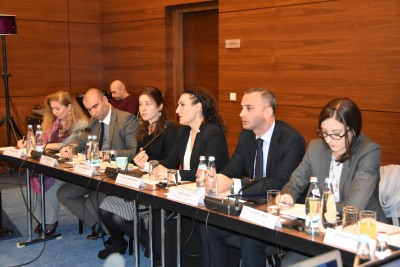Women's NGOs meet with participants of the Geneva International Discussions
Date:
The Office of the State Minister for Reconciliation and Civic Equality (OSMRCE), with technical support from UN Women, regularly organizes information-sharing meetings between the participants of the Geneva International Discussions (GID), representatives of non-governmental organizations and relevant development partners as part of the OSMRCE’s commitments under the Action Plan of Georgia on UNSCR 1325 and other resolutions on Women, Peace and Security (2016-2017).

Representatives of women's non-governmental organization and participants of the Geneva International Discussions talking about the outcomes of the official negotiations; Photo: The Office of the State minister for Reconciliation and Civic Equality
Issues such as access to education in native languages, freedom and security of movement, detention conditions and treatment, and problems with personal documentation and birth registration of the population in Gali dominated among issues raised by women’s NGOs during the information-sharing meeting.
“Meetings like this are of extreme importance for us for transparency and accountability purposes and also to have regular dialogue and exchange with civil society and development partners engaged in peace and confidence building,” remarked Ms. Ketevan Tsikhelashvili, State Minister for Reconciliation and Civic Equality.
The Geneva International Discussions, co-chaired by the UN, EU and OSCE, have been conducted four times per year since 15 October 2008, following the ceasefire agreement of 12 August 2008. The Discussions take place in two parallel working groups, one dealing with security and stability, and the other with humanitarian issues, including the issues of internally displaced persons and refugees.